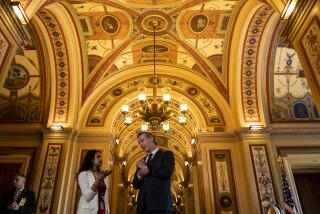Constituents Get a Front-Row Seat : W. Virginia Politician’s Affairs of State Often Turn Out to Be Kid Stuff
- Share via
CHARLESTON, W.Va. — The secretary of state will see you now. Take a left at the stuffed bear and stop at the smallest, messiest desk in the office. No appointment? No problem. Bringing 31 5-year-olds with you? Come right in.
In West Virginia, the secretary of state will see you any time. Bring the kids and he will spend 20 minutes on his 71-year-old knees, passing out stickers of the state flag, explaining his duties, giving an impromptu history lesson.
The secretary of state is Ken Hechler. To the people of West Virginia, that is explanation enough for the unorthodox goings-on in the Statehouse suite that has been renamed “The People’s Office.”
It explains why no one asks who is calling before putting you through to Hechler (his staff is under orders not to screen his calls); why the big desk in the inner office is vacant, and why first-time visitors invariably walk right past the outstretched hand of the tall, smiling, bespectacled man in the lumpy blue sweater who’s sitting right out in the thick of things.
“I like to do things a bit differently,” Hechler said.
Singing Opera
Differently, as in coal miners singing opera to enliven one of his early congressional campaigns; differently, as in using a red Jeep for his headquarters and serving applesauce cake on the hood at the opening; differently, as in having the state animal--a stuffed bear--standing sentry outside his office.
He has been doing things differently since the 1930s. Most graduate students headed for the library to write their dissertations. Hechler compiled his, on public law and American history, while hitchhiking across the Midwest.
His odyssey through American politics has been no less unconventional. It’s taken him to the inner sanctums of President Harry S. Truman and presidential aspirant Adlai E. Stevenson, and eventually to his own U.S. House seat, which he held for 18 years.
Along the way, Hechler has written half a dozen books, including a best seller. He has interrogated Nazi war criminals, ridden herd on the coal industry, championed millions of little people and aggravated countless big people.
All the while, he has stressed service over style, providing a mixture of hard work and pure silliness as he practiced the populist politics he acquired as a speech writer and advance man for Truman during the President’s whistle-stop days.
“He used to say that the rich and powerful have their own lawyers, lobbyists and accountants,” Hechler said. “The average person is who we’re working for.”
It’s still good advice, Hechler said. “The priorities of politicians are all out of whack. If they’d spend more time with average people instead of advertising themselves, they’d be amazed how popular this would make them.”
In the people’s office, there is often a fine line between the two.
Each weekday, Hechler’s constituents stream into his office, adding their problems to the stack on his desk. A citizens group can’t find a place for a meeting. (“Here, use my office.”) Thirty-one sleepy 5-year-olds would like an audience with the secretary. (“Come right in.”) An uncovered coal truck careens around a corner, dumping its load on a Charleston housewife’s lawn. (Hechler used the example to lead the charge against a bill that would have allowed truckers to operate overweight trucks if they bought special licenses. The measure was subsequently vetoed.)
Spend a few hours in the people’s office and you get the idea; the small messy desk in plain sight of all visitors is a metaphor of sorts for Hechler’s approach to politics.
‘A People’s Politician’
“I don’t want people ever to say, ‘He’s in a meeting,’ when someone calls or stops by,” he said. “When people come all the way up here to see the secretary of state, they ought to see him.”
A. James Manchin, who left the secretary of state’s office to become state treasurer last year, calls his successor “a people’s politician. He’s kind of unique in that his whole life is designed to help people.”
“He’s very conscientious and highly individualistic, kind of a loner who’s never been one to associate much with other politicians,” Manchin said.
Indeed, after leaving Congress in 1976 for an unsuccessful campaign for governor, Hechler stayed away not only from politicians but also from politics for eight years. In 1984, he couldn’t resist coming back, choosing a state office over the decidedly more glamorous environment of Washington.
For unreconstructed liberals like Hechler, these can be perilous times, though he doesn’t seem worried. He calls the prevailing conservative climate “a temporary setback” and says, “The pendulum will swing back in time.”
“These things come in cycles,” Hechler said. “People interested in progress usually triumph in the end.”
He said he returned to politics because he sensed “a vacuum. There weren’t people fighting for the average person. People kept calling on me to do the things I had done as a congressman, and I didn’t have a platform.”
His current job appeals to him because “corruption and fraud in elections had given West Virginia a bad name. As secretary of state, I’m the chief election officer.”
Although he no longer carries the clout of a congressman, Hechler still manages to serve as a self-styled ombudsman, clearing the tangled trail between people and government. Since taking office on Jan. 1, 1985, he said his goal has been to modernize services, launch new public information programs and help citizens solve problems with everything from housing to health care.
Parents Prominent Republicans
The son of prominent Republicans whose politics he eschewed early on in favor of the Democratic Party, Hechler grew up on Long Island and studied political science at Brandeis University before earning graduate degrees from Columbia University.
His four years of military service as a World War II battle historian and member of a team assigned to interrogate captured Nazis earned him a Bronze Star as well as material for his book, “The Bridge at Remagen.” The best seller, an account of a surprise crossing of the Rhine by a group of American infantrymen, was later made into a movie.
After his military discharge, Hechler accepted a teaching job at Princeton University, where students who had signed up for his early-morning class in American Political Parties arrived to find a telephone and amplifier in place of the usual podium.
Hechler used the phone to wake up political big shots around the country for his students to interrogate.
From there, it was on to Washington to become special assistant to Truman and later research director for Stevenson, whose defeat in the 1956 election left him “totally disillusioned.”
When he heard of a temporary opening for a political science professor at Marshall University in Huntington, a city he had visited for Truman, Hechler decided to return to teaching.
Exhorts Students
At Marshall, he told his students: “You are in politics, whether you like it or not. If you sit it out on the sidelines, you are throwing your influence on the side of corruption, mismanagement and all the forces of evil.”
Fair enough, replied the students. What’s your excuse?
Upon reflection, Hechler decided he had none, notwithstanding his brief tenure in the state (just long enough to become eligible to vote), his failure to acquire a pretty wife to parade past the TV cameras (he said he is still looking) and his complete lack of experience as a candidate.
Opposing two native sons in the traditionally Republican 4th Congressional District, Hechler quickly found that to many West Virginians family ties meant as much as past associations with Presidents.
“ ‘Who you kin to?’ people would say. ‘Hechler? I’ve never heard that name before.’ ”
By the time primary day rolled around, West Virginians had heard the name plenty. Hechler and his student volunteers campaigned from dawn to midnight, touring the district’s 10 counties in the candidate’s red-and-white convertible with campaign signs plastered all over it.
‘The Lonely Battle’
His gimmicks included passing out hundreds of free copies of his book, publicizing his letters of praise from Truman and referring to his campaign as “The Lonely Battle.” The underdog strategy worked; he carried seven of 10 counties.
In the general election, facing a two-term Republican incumbent, Hechler played up his relative poverty for all it was worth, which turned out to be quite a lot in 1958, a bad year for the West Virginia economy.
His campaign cards, printed on cheap paper, said: “The Recession Makes It Tough to Print a Better Card.” And his 10-second TV spots were pure corn pone, consisting of amateur opera singers dressed as coal miners, housewives and students belting out a song of his own invention, sung to the tune of “Sugar in the Morning.” The chorus: “Hechler in the morning, Hechler in the evening, Hechler at election time.”
“We can’t afford more television time,” he solemnly told his audiences, “but I hope you’ll vote for me anyhow.”
Enough of them did to enable Hechler to change the sign on his convertible to read: “Dr. Ken Hechler--Your Servant in Congress.”
‘Putting Lipstick on Corpse’
As a congressman, Hechler was the principal author of safety legislation in the Federal Coal Mine Health and Safety Act of 1969, and a staunch opponent of strip-mining. “Strip mine reclamation,” he once said, “is like putting lipstick on a corpse.”
He also escorted reporters around coal country, introducing them to “miners wheezing and suffering from coal dust in their lungs.”
Hechler said West Virginia hasn’t changed all that much since his days as an upstart congressman. “This state is very rich in resources and potential, and it’s populated by the most unselfish and friendly people, yet those people are exploited, primarily by out-of-state interests,” he said, citing the coal, chemical and lumber industries that dominate the economy.
“If people would realize that there are more people than exploiters, that could change.”
More to Read
Get the L.A. Times Politics newsletter
Deeply reported insights into legislation, politics and policy from Sacramento, Washington and beyond. In your inbox twice per week.
You may occasionally receive promotional content from the Los Angeles Times.










